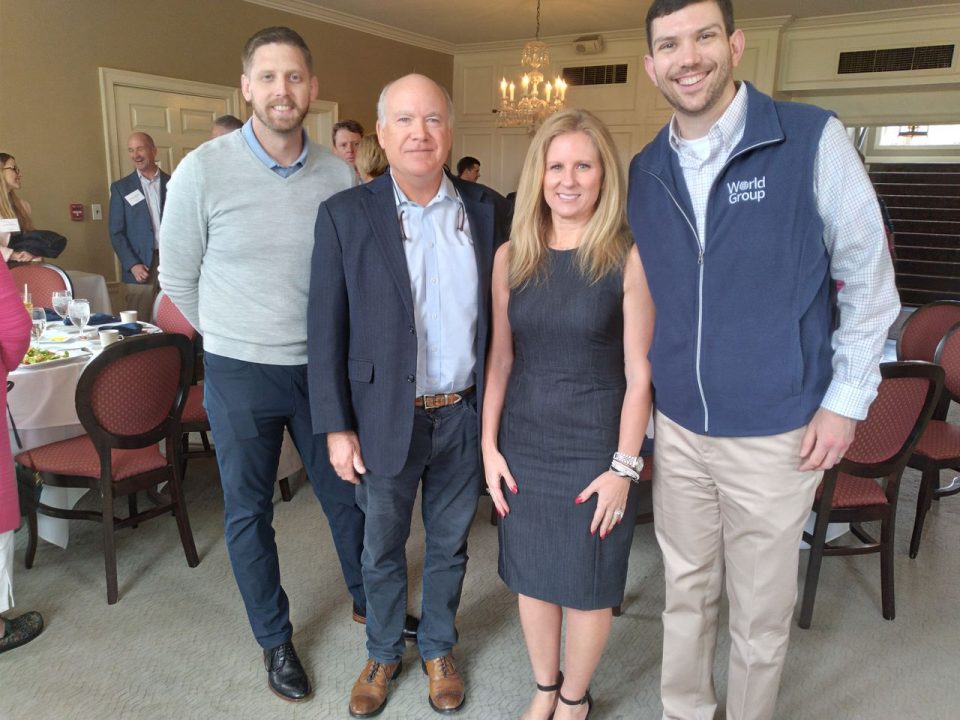ROCKY RIVER, Ohio — The Rocky River Chamber of Commerce recently invited local company World Group to give advice to businesses on the supply chain difficulties so many companies have endured during the pandemic.
The casual conversation with four members of World Group’s management team brought everyone closer to understanding the trials and tribulations of the current supply chain issues, while also providing some perspective on a successful local company and how it is coping.
Members of management from World Group who attended the chamber meeting included Fred Hunger, chairman; Jackie Csiszar, vice president of vessel operations; Kevin McClelland, corporate communications specialist; and Evan Hartman, vice president of UWL Inc., a World Group company.
About 30 chamber members attended the conversation, which focused primarily on questions from the various company representatives in the audience. World Group gave examples of how the company has dealt with or solved many supply chain challenges.
As attendees asked questions, the four representatives from World Group tossed their answers back and forth among themselves to give the audience various perspectives and possible solutions. They also showed how what can be perceived as a huge, negative challenge can turn out differently.
What was the pandemic effect on World Group?
“It opened some doors to us for more penetration and more new customers and also clients with larger ships,” they said.
The supply chain is primarily held up by long waiting periods before ships can be unloaded, they said. And even when the ships begin to be unloaded, the containers may sit for at least three hours per day (and sometimes four to five hours) at the port, or the railway or the final destination — a distribution center — and sometimes at a cost of about $250 per container per day.
“Without steady supply chains, there are higher costs,” they said.
Some of the keys World Group gave to the audience included information on driver retention. In order to keep drivers, they are now paying an increase of about 20 percent to entice the drivers “to stay in the game.” They noted that it is “part of the equation in the inflationary cycle that we are now experiencing.”
When asked about unions perhaps exacerbating problems, they said: “Unions are in a position of power right now. At the bigger ports, they have a large share of the containers (from the ships). It may all add to more woes, but there are no signs of that yet.”
As to drivers being recruited as young as 18 years of age now, they noted that more drivers are applying for driving training, but that no federal legislation has come to the forefront yet to assure that the younger drivers can be hired.
Other questions were about how about self-driving and electric cars might cut costs, about American companies doing business with China and dealing with the lockdowns in that country, and whether companies are having second thoughts about bringing manufacturing back to the United States.
World Group representatives said those are all possibilities, but that the market is looking forward about two years for those things to happen, especially for large importers that are getting very backlogged.
When asked about government regulations here in the U.S., attendees were told there has not been an important impact so far.
“Providers like us are easing conditions,” they said. “And there are terminals that are making room for loads — avoiding gridlocks.”
When will the supply chain problems end?
“At least six months out, depending on more lockdowns” was the answer.
It was also noted that, currently, there are fewer contract rates, but more “spot” rates. World Group said: “To protect our margins, it is easier with spot rates. We don’t want drivers to sit for hours in ports.”
For more information on World Group, visit https://www.worldshipping.com/.
Read more from the West Shore Sun.


